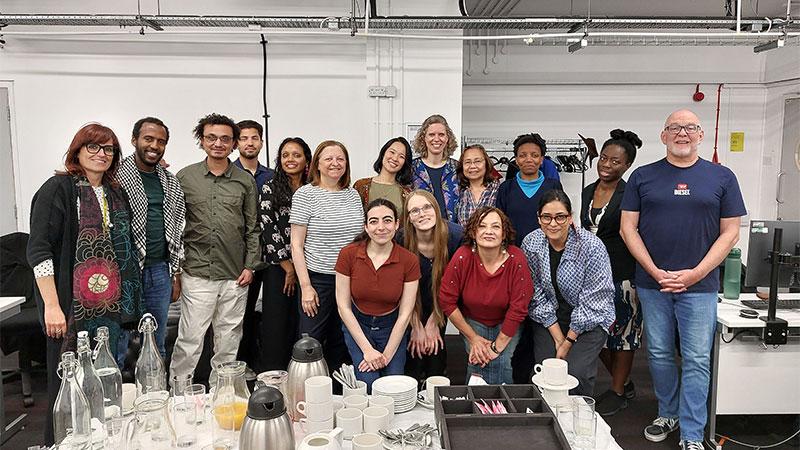The University of Westminster has run a two-day podcasting course held at the University’s Regent Campus, bringing together participants from the national charity Migrant Voice and Westminster colleagues involved in a major European migration research project.

Running between 9-10 June, the podcasting course provided participants with hands-on experience in planning, producing and publishing podcasts – a key medium for inclusive communication, personal expression and social impact.
The course was funded and supported by the Centre for Education and Teaching Innovation (CETI), the Quintin Hogg Trust (QHT) and Westminster’s School of Media and Communication (WESMEC), and was led by Eleanor Roseblade, Senior Lecturer in Media and Project Lead for Westminster Waves London. The sessions were delivered by Dr Aasiya Lodhi, Simon Woolcott and Natasha Fernando from WESMEC, with production support from Julia Parent and Eliza Gratta, students from the University’s Film, Television and Moving Image MA course.
Participants from Migrant Voice, a migrant-led national organisation, took part in the course to develop their digital storytelling and podcasting skills. Migrant Voice supports asylum seekers, refugees and migrants across the UK to speak for themselves, influence public debate and advocate for social justice.
Also taking part were researchers working on the Crisis of Migration Discourse project, funded by HERA/CHANSE through Horizon Europe. The project, led by the University of Westminster in collaboration with institutions in the UK, France, Denmark, Spain and Italy, explores the language and narratives surrounding migration in Europe. It aims to move away from "crisis" narrative by working with illegalised migrants as active contributors to changing how migration is understood and discussed.

Professor Roza Tsagarousianou, Professor of Media and Migration, leads the international research consortium and is the Primary Investigator for the UK and Italy. She is supported by co-investigator Dr Federica Mazzara, Researcher in Cultural Studies, and Professor Federico Faloppa from the University of Reading.
Dr Doug Specht, Head of the School of Media and Communication, said: “Working closely with community partners is at the heart of what we do at the School of Media and Communication. These real-world collaborations offer our students transformative learning experiences, grounding their academic knowledge in practice and empowering them to become agents of positive change in society. By immersing students in live projects and meaningful engagement with the wider world, we ensure that their education is not only relevant but also deeply authentic and impactful.”
Eleanor Roseblade added: "This is the first in what we hope will be many podcasting courses, where we teach others to find their voice and work in partnership with students to create a platform for community podcasting. At the heart of this initiative will be the launch of Westminster Waves, a digital radio station dedicated to connecting the Westminster community.”
This course directly contributes to the United Nations Sustainable Development Goals (SDG) 10: Reduced Inequalities, 16: Peace, Justice and Strong Institutions and 17: Partnerships for the Goals. Since 2019, the University of Westminster has used the SDGs holistically to frame strategic decisions to help students and colleagues fulfil their potential and contribute to a more sustainable, equitable and healthier society.
Find out more about the School of Media and Communication at the University of Westminster.








